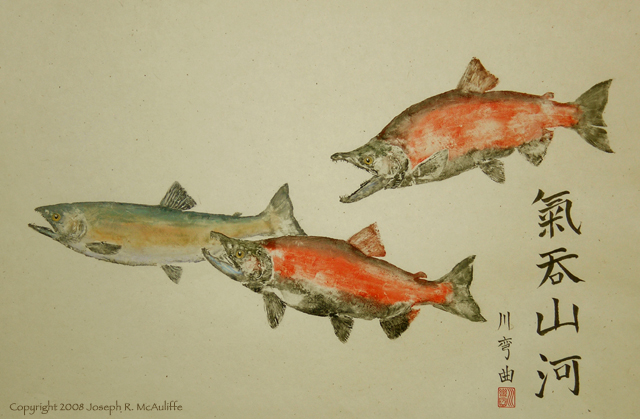 Matthew 27
Matthew 27A few days ago we took our kids and my mother-in-law to see the kokanee salmon run. Every year around Labor Day they begin to spawn, turning from silver to bright orange and then a deep red, and travel upstream to lay their eggs and die. Kokanee are the landlocked version of sockeye salmon, and they live for four years before they mature, mate, and begin their journey home. And that journey is work.
While Beck (5) spent most of his time poking holes in the mud with a giant stick and Cael (7) reported how many disgusting spiders he found along the banks of the river, the rest of us watched in amazement as these bright red fish fought their way upstream, against a strong current and around rocks and small eddies that constantly threatened to push them back, and often did.
At the beginning of a run, there are piles of salmon. My dad and stepmom saw them weeks ago and marveled at how they clambered over each other in a wrestle to get just a little farther upstream, determined to arrive at their birthplace and to get there in time. Years ago I watched this process in Alaska. Even the gutters were filled with them, as if all the waters had been turned red. It was downright Biblical. They were going home. And nothing was stopping them.
That pull for home is real. If a salmon feels it, knows it, is carried by it, why not humans? In the end, our travels are generally not linear but circular. If some magnetic field drives a fish to swim against all odds upstream to the place it began, that same magnet is invariably planted deep inside us. We're not complete without it. And it seems to increase the closer we are to the end of life. My next door neighbor Jackie is 85, and her husband M.C. is in his mid 90s. Alzheimer's and dementia are setting in for him, and every night before bed he asks Jackie where his mama and his sisters are. She has to tell him, every night, that they're gone. Most of them died more than twenty years ago. He sits in his chair and cries for them. Jackie comforts him, tries to reorient him, knowing she'll have to break the news the next night and watch him grieve for them all over again.
I've wondered for weeks what I could say about the death of Jesus. What hasn't been said? Everyone knows the story. The mystery of that kind of love still eludes us, so much that many choose not to believe it. But in this chapter there are people for whom his death is the deepest of tragedies.
Joseph of Arimathaea, described as " a rich man" and a disciple of Jesus, comes and, in Matthew's words, "begged the body of Jesus." That he must have had some sway, either with his money or his position, seems obvious since Pilate commands the body to be delivered to him. And he takes this body and places it "in his own new tomb." What would a wealthy man want to do with a poor prophet? Something pulled him to Jesus, something that made him show up at a critical, political, chaotic moment and beg for his body. There is a tenderness there that transcends normal interactions between grown men. Something extraordinary is at play here.
The Marys are there too, having followed him from Galilee, "ministering unto him" through his travels, and now they are the last to stick around when the curtain falls. After the tomb is sealed and everyone leaves, Matthew records, "And there was Mary Magdelene, and the other Mary, sitting over against the sepulchre." They can't leave. It's as if they are staked to where he is. I can't help but wonder if what they felt with him was a kind of coming home, as if he was their home. He had no home - he had nowhere to lay his head, he says - but he was a home for the people who loved him. His teachings are still a home.
But then, Jesus must have known how this felt, even deeper than they did. He had a hard life. The ending was excruciating. And by his own words, it was all by choice. To wrestle every day against a world that hated you one would need to have a reason, something that pulled you, a craving that could only be filled by one thing: the chance to go home.
No comments:
Post a Comment